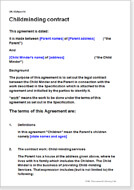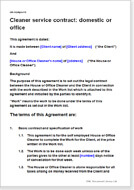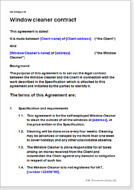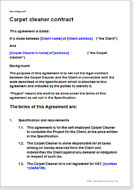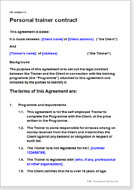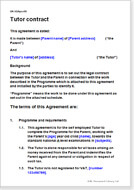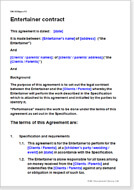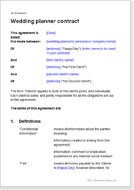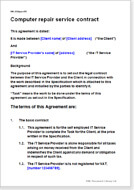Consumer service provider agreements
These contracts have in common that they are for a business or sole trader who provides a service to consumers where all or part of the work is carried out off-premises, often likely to be at the client's home.
They are relatively short, uncomplicated agreements, designed to protect the service provider, that any client should be very happy to sign.
Childminding contract
This is a template for a self-employed childminder or carer.
It is a short agreement, designed to give you strong legal protection, without seeming threatening to your clients. The main purposes of the document are to set out the expectations of both sides, and to make sure you comply with the law.
Cleaner service contract: domestic or office
This short, simple service document is for self-employed house or office cleaner. It is assumed that the cleaning work will not be unusual.
You may work in your own name or through your company.
This contract will help you comply with the law regarding providing services in your clients’ homes and limit your liability for things that are not your fault.
Just add specification for actual cleaning work and you have contract that a private client will be happy to sign.
Window cleaner contract
This document is for a self-employed window cleaner, covering both traditional window cleaning with leathers with or modern equipment.
Using it, you can sign clients up to an on-going contract to prevent them from cancelling after a couple of visits.
You might work in your own name as a sole trader, or through your company.
The document uses a simple style and plain English so that your clients will sign without question.
It provides you with legal protection in case clients do not pay, claim that you have not cleaned inaccessible places, or blame you for things that are not your fault. It also helps you to comply with the law regarding selling to consumers in their own homes.
Carpet cleaner contract
This is a contract for carpet cleaning that can be used on small as well as large jobs.
You may work as a sole trader or through your own company, and your clients may be domestic or business.
This is a short contract in plain English that will not intimidate your client, but that will limit your liability, ensure you are paid, and allow you to comply with consumer selling regulations.
Personal trainer contract
This is a template for a personal fitness trainer to use with private clients.
The trainer may work in the home of the client, in a public space such as a park, or at the client’s gym.
The document sets out the expectations of both sides including covering: performance targets and work required to meet those targets, payment, failed appointments and no-shows. It also covers limitation of the trainer’s liability, safety and insurance.
It allows the trainer to be paid up-front for a specific number of sessions or for payment by the week or month.
Use of plain English makes the contract easy to edit, and unthreatening for the client to sign.
Tutor contract: home or away
This is a contract for someone who offers private tutoring at a client’s home, on your own premises or at a public space such as library.
We presume the pupil is a child, but he or she could also be an adult. You may be teaching any subject.
Although a short document, it provides you with legal protection, helps you to comply with the law regarding selling your services to your clients at their home, and sets your clients’ expectations as to what they should expect from you. The document is written in plain English.
You can present the document to your clients as your terms, or you could use it as a basis for negotiation on a client by client basis.
The contract includes, among other provisions:
- the tutorial work to be done and exam targets, if any
- your relationship with the child and undertakings by parents
- practical obligations of the parents, including: insurance, childrens’ discipline and household administration
- your account and expenses
- interruptions
- confidentiality: protecting your privacy and theirs
- limitation of your liability if the pupil does not achieve the targets set
Entertainer contract
This document is for a self-employed entertainer, for example, a musician, comedian, DJ, or magician to work in a private venue.
The client may be a private individual or a business. You may be entertaining children or adults.
It includes provisions relating to:
- clients’ obligations as to event management, venue administration and control of the audience’s behaviour
- strong provisions on mutual confidentiality (particularly to make clients responsible for what may be posted on a social network)
- practical obligations of clients for insurance
- limitation of your liability
Wedding planner contract
This agreement is for use by a professional event planner rather than a client.
Although tailored for weddings, it could be easily edited to be a suitable contract for planning any event such as a milestone birthday party or corporate event, of any size, and whether your involvement is partial or total.
It is drawn so that it will be acceptable to the client in plain English. But it strongly protects the event planner.
In particular, makes sure every contract with a supplier or provider is made, in law, with your client, so that you can never be liable for failure of a sub-contractor.
You could use this document as your standard contract or allow negotiation of terms.
Specific terms include:
- obligations of the client and the planner
- the planner’s power to take urgent action – so that you can solve problems quickly, without having to consult the clients
- finding and using suppliers
- termination - what happens if the date is changed or the clients fail to pay
Computer repair service contract
This is a contract for a self-employed computer service engineer in the home or the office of a client.
You might work in your own name or through your company.
Your work could be any related to IT such as: installation or repair of hardware, installation of software, bug fixing or recovery of files.
Just add the specification for the work you carry out and you have simple, short contract suitable for a private client with all the provisions you need.
Importantly, it disclaims your liability for problems outside of your control, and helps you make sure you are paid for the work you do.
Note: if you want to present yourself as a consultant, use our IT consultancy contract.

If the document isn’t right for your circumstances for any reason, just tell us and we’ll refund you in full immediately.

We avoid legal terminology unless necessary. Plain English makes our documents easy to understand, easy to edit and more likely to be accepted.

You don’t need legal knowledge to use our documents. We explain what to edit and how in the guidance notes included at the end of the document.

Email us with questions about editing your document. Use our Lawyer Assist service if you’d like our legal team to check your document will do as you intend.

Our documents comply with the latest relevant law. Our lawyers regularly review how new law affects each document in our library.
Strong legal protection from uncomplicated contracts
Despite dealing with very different services, these documents have in common that the service could be provided to a client in his or her own home, or at least the contract could be signed in the client’s home.
If that is the case, then the Consumer Contracts (Information, Cancellation and Additional Charges) Regulations 2013 impose obligations that are difficult to avoid.
The key to compliance is to accept the obligations they impose and just make your compliance part of your business system. All these documents give you the full but minimum requirement for compliance with the law in so far as it relates to your contract.
You can find out more about your obligations in our guide to the Consumer Contracts Regulations.
The other similarity between all these documents is that although each is drawn with a view to a particular trade or profession, all cover similar provisions to make sure that you are paid promptly, that your liability for things outside of your control is limited, and that you are protected - as far as the law allows - from unreasonable demands, disagreements, defamation (especially from lies published on social media sites or review websites).
Flexible documents
Every one of these contracts gives you options in some areas. We do not expect you to change your business model. It is our task to give a template that is flexible enough to fit in with what you want.
In addition, of course, you can edit your document. It comes in Microsoft Word format so you can play around with the content, style and format as much as you like. If you don’t have Word, we can convert it for you to a format you can use.
Why a short, simple contract will benefit you
Many people who provide a service to clients at home simply do not want to present a contract. There could be a number of reasons: to do so may seem pompous or untrusting, or even they may fear that the client will insist on talking to their solicitor before signing.
But the downside of not putting your terms in writing is that you leave yourself – and your business – at risk of a bad experience.
Our advice, as you would expect, is that you should use a contract without hesitation.
Clients will be happy to sign if you do just two things.
The first is to present your contract, not as a legal document first and foremost, but rather as a confirmation of the specification of work to be carried out. The 'legal part' can be disclaimed by you as a requirement that you would rather do without, but that you are forced to comply with.
The second thing is to use a short, simple contract, written in plain English. If it is easy to understand and doesn’t seem overly legalistic, clients will be reassured that they understand what they are signing.
Other common elements
Other points covered in these contracts, so far as relevant:
- interruptions and expenses - points that you need to cover to enable you to do the job
- your account, payment and expenses
- safety and insurance
- confidentiality: protecting your privacy and that of your clients
- dealing with emergency procedures in the home
All rights reserved

